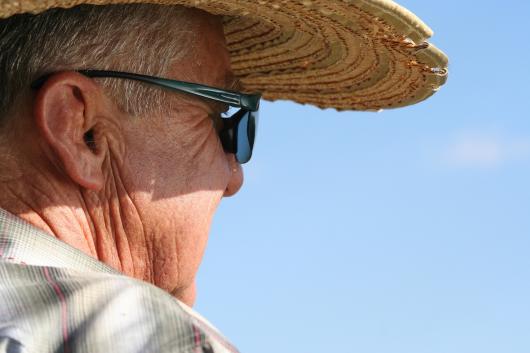
Dehydration is a common challenge for older people, especially those living with dementia. Here are some hand tips on ways to support people with dementia during periods of hot weather.
For many people, a heatwave is a chance to enjoy the hot weather in gardens, parks and outdoor spaces. But the heat can also cause discomfort and risk of dehydration.
If you have a loved one living with dementia, take a look at these helpful ways to support them when the temperatures soar.
Dementia and dehydration in hot weather
Dehydration is a common challenge for older people, especially those with dementia. Memory problems mean someone with dementia can easily forget to drink enough water.
What’s more, the part of the brain that recognises you’re dehydrated and sends a message to let you know you’re thirsty doesn’t always work properly. Some medications and dementia-related illnesses can also make dehydration worse.
5 tips for preventing dehydration
Here are some simple but effective ways of helping to prevent dehydration during hot weather:
- Leave glasses or jugs of water within easy reach. This is especially important for people with limited mobility, who aren’t able to get up and make themselves a drink.
- Make drinking easier. Have a clear glass so the person can see what’s inside (this may not work so well with water) or a brightly coloured cup to draw attention. Make sure the glass is within the line of sight. Having a glass that is suitable (not too heavy or an odd shape) can help. Straws might also be a good idea.
- Share a drink together. Have a cup of tea or an ice lolly with the person and make sure they’re drinking during mealtimes.
- Leave reminders. Make sure someone with dementia remembers to drink regularly by leaving notes out for them or putting up notices around the house. You could also set up a phone reminder or set an alarm clock.
- Provide high water content foods. Supplement water and other drinks with foods that are high in fluids. Some good options include jelly, ice cream, soup and fruit such as melon. ‘Water sweets’, such as Jelly Drops, can also help the person stay hydrated.
How to recognise dehydration
There are some things that may show a person is dehydrated. If you spot any of the following, encourage the person to drink water immediately and seek medical help if you need. If the condition worsens or doesn’t improve, go straight to the hospital.
- Increased confusion (compared to typical dementia symptoms)
- Dark and strong-smelling urine
- Dry mouth, lips and eyes
- Headaches or dizziness
- Feeling tired
- Not urinating very often (fewer than four times a day).
5 more tips to help people with dementia keep cool in hot weather
1. Make sure the person is dressed appropriately
If someone with dementia is dressing themselves, they might follow their usual routine and forget to dress for the weather. Light-coloured, loose-fitting clothes made from natural fibres can help keep people comfortable and prevent overheating. A hat or cap for outside is also a good idea.
2. Keep the house as cool as possible
Check that the central heating isn’t on, and invest in some fans if necessary. Keeping the curtains or blinds closed during the day – especially in sunny, south-facing rooms – can also help to keep things cool. In the evening, open the windows to let the warm air out and colder air in.
3. Avoid the midday sun
We’re all advised to stay out of the sun during the hottest part of the day (between 11am and 3pm), and this is even more important for people with dementia. When you’re out and about, seek out plenty of shade. Keep a bottle of sunscreen on you, and make sure it’s reapplied regularly.
4. Find ways to cool off
If someone with dementia is hot and agitated, help them take a cool bath or shower. You could also place a washcloth and some iced water nearby, so they can dab themselves when they need to. Try putting a frozen bottle of water or ice pack next to a fan, for some DIY air-conditioning.
5. Ask friends and neighbours to pop in and check if the person is ok
If you don’t live near the person or are worried about someone – ask a friend or neighbour to pop in and make sure they’re ok. They could stay and have a drink with the person and make sure they have everything they need.

